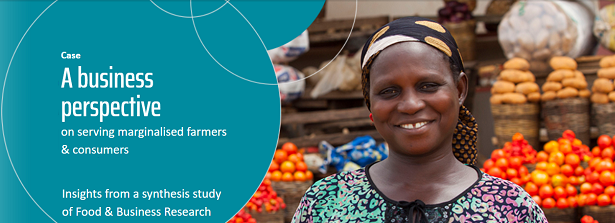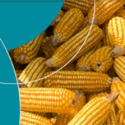A business perspective on serving marginalised farmers & consumers

How can the private sector optimally capitalise on research findings and innovations related to business opportunities that serve the food and nutrition security of marginalised farmers and consumers? This is the key question explored in a synthesis paper that has recently been produced discussing Research for Development insights and innovations. The synthesis report shows promising results in improving productivity, increasing income for the marginalised, and diversifying business and consumption opportunities. The synthesis demonstrates that insights and innovations were eagerly taken up if projects made a convincing, research-based case for the potential of their findings for improved food or nutrition security, and if this potential was aligned with private sector or government interests and priorities. This emphasises the relevance of bringing together stakeholders with different and complementary capacities, knowledge and networks, offering the best chances for contributing to lasting impact in the food system.
This is the first outcomes paper “Capitalising on knowledge – How research can enhance business opportunities that serve small-scale farmers, agri-entrepreneurs and poor consumers” of a larger series of publications commissioned by NWO-WOTRO, together forming a synthesis study of the Global Challenges Programme (GCP) and Applied Research Fund (ARF) projects under the Food & Business Research programme, executed by Daniëlle de Winter and Ellen Lammers.
This synthesis report presents the findings from fourteen interdisciplinary research projects on two outcome areas: firstly, innovations for agricultural production and processing that intend to meet (existing or anticipated) needs of poor and marginalised producers and consumers in LMICs; and secondly, new approaches or strategies to connect marginalised producers to the market.
On the first outcome area (product and process innovations) the synthesis identified four key approaches explored by the research consortia. The first approach is introducing new value chains to diversify economic opportunities. Several projects successfully introduced new value chains and actors aimed at structurally diversifying the economic activities of small agro-entrepreneurs. Examples are the introduction of (new) tree crops with multiple economic purposes (i.e. bee keeping, fodder for livestock, and wood for sales) or the introduction of insect-rearing for sales as alternative protein feed source for livestock. Importantly, the approach taken in introducing these new roles and value chains determined the level of uptake. Future projects should therefore carefully consider where to intervene in the value chain (e.g. by simultaneously guaranteeing supply of raw materials and sufficient processing capacity) and how different stakeholders are engaged in the process (e.g. putting needs and aspirations of marginalised producers first and making them co-owners rather than recipients of innovations). Farmers need to be part and parcel of the new value chain to ensure their commitment to investing in new opportunities and taking on manageable risks and responsibilities.
The second approach is adding value to raw materials for socio-economic benefits. Several projects that introduced processing or preservation technologies of raw materials for value addition (e.g. dairy fermentation, or drying of fruits and vegetables) showed that this can significantly raise the income of agro-entrepreneurs. The actual uptake of such value addition innovations by marginalised communities, however, was influenced by systemic factors such as access to knowledge, skills and a logistical network to coordinate supply and demand. The synthesis moreover highlighted that value addition technologies must be carefully applied and the resulting food products scientifically tested to guarantee their safety and quality. This may demand specific skills and equipment, which smallholders do not necessarily have access to. Government and private investments offering support in training and access to necessary equipment will be essential to overcome such barriers experienced by smallholders.
The third approach is improving business opportunities to benefit smallholders. Several research projects showed that, instead of introducing new value chains or value addition processes, applying innovative approaches to existing products and processes can also create better business prospects, especially for small-scale agro-entrepreneurs. Both relatively simple interventions (e.g. repackaging of vegetables grown in urban slums or improved infant formulae, or rebranding of local rice) and more technical ones (e.g. standardising production and processing for more efficiency, reliability and food safety) can be effective. The synthesis showed that delivering consistent quality is key when smallholders wish to sell their produce to processors or to formal markets and supermarkets. To ensure sufficient and continuous supply of raw material or standardised products for processors or markets, large numbers of smallholders need to produce consistent, high-quality quantities (e.g. of milk, cashew nuts, rice, vegetables or livestock feed). The high level of logistical coordination this requires is often not yet in place.
The fourth approach is improving nutritional value for improved nutrition security. Private sector actors played an important role in introducing innovations to improve the nutritional value of products that are produced and/or consumed by marginalised groups. The research projects demonstrated that the nutritional value of food products can be improved (e.g. through vegetable drying, improved fermenting processes) to benefit nutrition security. Yet, if these improved products are not marketed at a price affordable for poor consumers, this will only benefit the middle classes who in some African countries are increasingly interested in health foods. Several projects emphasised that, to get consumers on board, there is a need for awareness raising about the benefits of a more diversified diet. Better knowledge of consumer preferences is also critical, and was addressed in several projects through consumer surveys and tasting panels for new food products.
On the second outcome area (connecting farmers to markets) the synthesis shows that for innovations to be successfully marketed, adopted and applied, local and small-scale food entrepreneurs need support from other actors in the food system, that is, from both the policy/political and private business sectors.
Finally, and as a cautionary note for both policy and practice, the synthesis shows that stimulating income-generating activities or market inclusion for small-scale agri-entrepreneurs does not automatically lead to improved food and nutrition security within their households. Multiple factors beyond private sector innovation and engagement, play a role in ensuring that small-scale food producers and agri-entrepreneurs as well as poor consumers become more food secure. Including awareness raising on the nutritional value of products and reducing hidden costs of small-scale entrepreneurship.
Downloads
- Download the full paper “Capitalising on knowledge – How research can enhance business opportunities that serve small-scale farmers, agri-entrepreneurs and poor consumers“
- Download the executive summary “A business perspective on serving marginalised farmers & consumers“
Authors: Daniëlle de Winter and Dr Ellen Lammers.






